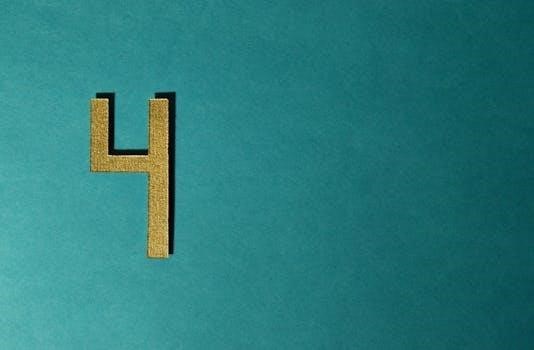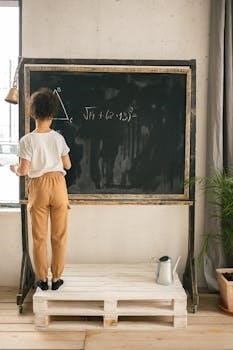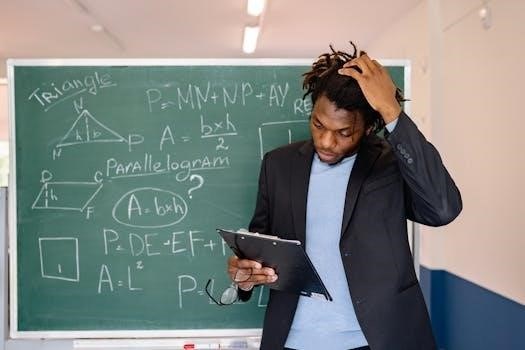Math Olympiad problems are challenging mathematical questions designed to test problem-solving skills. They often require creative thinking and a deep understanding of mathematical concepts. Resources like PDFs offer solutions to past problems, aiding preparation.
Overview of Math Olympiads
Math Olympiads are prestigious international mathematics competitions designed for high school students, often including problems ranging from elementary algebra to more complex topics. These competitions, such as the International Mathematical Olympiad (IMO), aim to identify and nurture mathematically gifted students. The structure of these olympiads typically involves several rounds, with each round presenting a new set of challenging problems. Participants are evaluated on their problem-solving approach, logical reasoning, and mathematical accuracy. Math Olympiads also help promote analytical thinking skills and encourage a positive attitude toward mathematics. Many resources, including PDF documents, offer problems and solutions from past olympiads, allowing students to practice and improve their skills. The problems are designed to test creativity and in-depth knowledge, going beyond standard classroom material.

Types of Math Olympiad Problems
Math Olympiad problems encompass various mathematical areas. These include algebra, geometry, number theory, and combinatorics, each demanding unique problem-solving techniques and in-depth understanding for successful solutions.
Algebra Problems in Olympiads
Algebra problems in math olympiads often go beyond standard textbook exercises. They delve into areas like polynomial manipulation, functional equations, and inequalities, demanding a strong grasp of algebraic structures. These problems frequently require clever substitutions, factorization techniques, and sometimes, the application of advanced algebraic theorems. Students may encounter problems involving sequences and series, requiring them to recognize patterns and apply summation formulas. Furthermore, problems exploring the properties of equations and their roots are commonplace. A deep understanding of algebraic manipulations, along with creative problem-solving strategies, is crucial for success. Proficiency in these areas is typically tested in various national and international mathematical competitions, with solutions often requiring multiple steps and rigorous justification. Consequently, practice with diverse algebra problems, especially those found in past olympiad papers, is essential.
Geometry Problems in Olympiads
Geometry problems in math olympiads frequently involve intricate diagrams and require a strong understanding of geometric theorems and properties. These problems may explore areas such as cyclic quadrilaterals, triangle centers, and advanced geometric constructions. Often, a keen eye for hidden relationships and symmetries is vital for finding elegant solutions. Olympiad geometry problems often demand a combination of synthetic and analytic approaches, sometimes requiring the use of coordinate geometry. The application of trigonometric identities and the properties of similar triangles are also commonly required. Problems might involve proving geometric inequalities, determining areas and volumes, or dealing with properties of specific geometric objects. A profound understanding of classical geometry theorems and the ability to visualize spatial relationships is crucial for tackling these challenges. Practice with past olympiad problems, especially those with solutions available in PDF format, is highly recommended for building proficiency in this area.
Number Theory Problems in Olympiads
Number theory problems in math olympiads delve into the properties of integers, prime numbers, divisibility, and modular arithmetic. These problems often require a deep understanding of concepts like the Euclidean algorithm, Fermat’s Little Theorem, and the Chinese Remainder Theorem. Olympiad number theory questions can involve proving properties of sequences, finding solutions to Diophantine equations, or exploring the behavior of functions defined on integers. A strong foundation in modular arithmetic and the ability to use induction effectively are essential. Many problems require clever manipulations and the application of subtle results from number theory. Solving these problems often involves a combination of creative insights and careful reasoning, making them a challenging yet fascinating area of mathematics. Accessing past olympiad problems with solutions, ideally in PDF format, is an invaluable resource for practicing and improving skills in this domain. Mastery in this area greatly helps in tackling many challenging mathematical problems.
Combinatorics Problems in Olympiads
Combinatorics problems in math olympiads explore counting techniques, arrangements, selections, and the study of discrete structures. These problems often involve permutations, combinations, the inclusion-exclusion principle, and generating functions. Olympiad combinatorics questions can range from simple counting problems to complex scenarios requiring clever techniques and logical reasoning. Solving them often demands a systematic approach and the ability to break down problems into smaller, manageable parts. Pigeonhole principle, recurrence relations, and graph theory are also frequently used in this area. Combinatorial arguments must be precise and well-justified. Proficiency in combinatorics is crucial for success in math competitions, as it tests the ability to think logically and creatively with discrete structures. Access to past olympiad problems with solutions in PDF format is very helpful for students preparing for these challenges. Careful practice and the study of various problem-solving methods are essential for mastering combinatorics.

Resources for Math Olympiad Preparation
Effective preparation involves utilizing online platforms, books, and PDF resources containing past problems and solutions. These materials provide valuable insights and practice for tackling challenging math olympiad questions.
Online Problem Solving Platforms
Numerous online platforms offer a wealth of resources for math olympiad preparation, often including interactive problem sets and solutions. These platforms provide a structured learning environment, allowing students to practice at their own pace. Many feature forums where users can discuss problems and share approaches, fostering a collaborative learning experience. Specifically, platforms like Art of Problem Solving (AoPS) are popular for their comprehensive collections of problems and resources for students in grades 5-12. These resources include math texts, online classes, and more. Accessing these online tools can significantly enhance a student’s understanding of mathematical concepts and improve their problem-solving abilities. Furthermore, some platforms provide past olympiad problems with solutions in PDF format, which can be extremely beneficial for practice and review.
Books and PDF Resources for Olympiad Problems
Books and PDF resources are invaluable for math olympiad preparation, offering a wide array of problems and detailed solutions. Many publications compile past olympiad problems, often categorized by topic, allowing for targeted practice. These resources frequently include step-by-step solutions, which helps students understand the reasoning behind each approach. Furthermore, numerous online repositories provide free downloadable PDFs of past olympiad papers and solution sets; These materials are particularly useful for self-study and for familiarizing oneself with the types of problems commonly encountered. Texts like ‘Mathematical Olympiads 1995-1996’ are examples of such comprehensive collections. The availability of these resources in both book and PDF format allows students to access them conveniently and practice at their own pace. Additionally, many online platforms offer supplementary PDF materials for further study.

Examining Past Olympiad Problems
Reviewing past olympiad problems, especially those with solutions in PDF format, is crucial. This allows students to understand common problem types and effective solution strategies.
Analyzing Solutions from Previous IMO Exams
Delving into the solutions of past International Mathematical Olympiad (IMO) exams provides invaluable insights into the problem-solving techniques favored by these competitions. These solutions, often available in PDF format, showcase not just the final answers but also the rigorous and logical steps needed to arrive at them. By studying these detailed solutions, aspiring participants can learn to approach complex problems systematically, breaking them down into manageable parts. It is beneficial to understand the underlying mathematical principles and theorems that are frequently applied, as well as recognize common patterns and strategies used in solving challenging questions. This process of analyzing past solutions fosters a deeper understanding of mathematical concepts and enhances one’s problem-solving skills, enabling students to tackle future olympiad challenges with greater confidence and proficiency. Moreover, it exposes students to a wide range of problem types, helping them to broaden their mathematical toolkit.

Consistent practice with past problems and solutions is key to success. Utilize PDF resources and online platforms to refine skills. Continued dedication will enhance problem-solving abilities.
Tips for Success in Math Olympiads
To excel in math olympiads, consistent practice with a variety of problems is essential, focusing on both speed and accuracy. Reviewing past olympiad problems and their solutions, often available in PDF format, helps in understanding common patterns and techniques. Time management during the exam is crucial; allocate time wisely for each question. Furthermore, developing a strong foundation in core mathematical concepts, such as algebra, geometry, number theory, and combinatorics, is paramount. Explore resources like online problem-solving platforms and math texts to deepen your understanding. Don’t hesitate to seek help from mentors or peers when stuck on a problem. Cultivate a mindset of perseverance and resilience, viewing challenges as opportunities for growth. Effective study groups can also provide valuable peer learning and support. Remember that success often comes from consistent effort and a genuine love for problem-solving, not just innate talent. Finally, stay updated with the latest trends and problem styles in math competitions;
